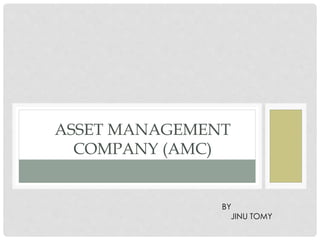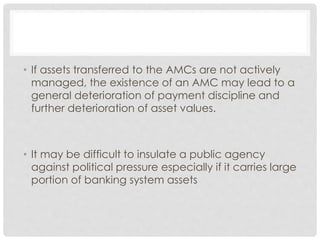Amc
- 2. DEFINITION  Asset management is a systematic process of deploying, operating, maintaining, upgrading, and disposing of assets cost-effectively.  A company that invests its clients' pooled fund into securities that match its declared financial objectives.  Asset management companies provide investors with more diversification and investing options than they would by themselves.
- 3. ABOUT AMC • Mutual funds, hedge funds and pension plans are all run by asset management companies. These companies earn income by charging service fees to their clients. • AMCs offer their clients more diversification because they have a larger pool of resources than the individual investor. • Pooling assets together and paying out proportional returns allows investors to avoid minimum investment requirements often required when purchasing securities on their own, as well as the ability to invest in a larger set of securities with a smaller investment.
- 4. ADVANTAGES • Consolidation of scarce work out skills and resources within one agency. • Can help with the securitization of assets as it has a larger pool of assets. • Centralizes ownership of collateral, thus providing (potentially) more leverage over debtors and more effective management. • Breaks links between banks and corporates and thus could potentially improve the collectability of loans.
- 5. • Allows banks to focus on core business. • Improves prospects for orderly sectoral restructuring of economy. • Allows the application of uniform workout practices. • Can be given special powers to expedite loan recovery and bank restructuring.
- 6. DISADVANTAGES • Banks have informational advantages over AMCs as they have collected information on their borrowers. • Leaving loans in banks may provide better incentives for recovery—and for avoiding future losses by improving loan approval and monitoring procedures. • Banks can provide additional financing which may be necessary in the restructuring process.
- 7. • If assets transferred to the AMCs are not actively managed, the existence of an AMC may lead to a general deterioration of payment discipline and further deterioration of asset values. • It may be difficult to insulate a public agency against political pressure especially if it carries large portion of banking system assets
- 8. TOP ASSET MANAGEMENT COMPANIES IN INDIA • UTI Asset Management • Birla Sun Life Asset Management • Reliance Mutual Fund • Tata Mutual Fund • SBI Mutual Fund









